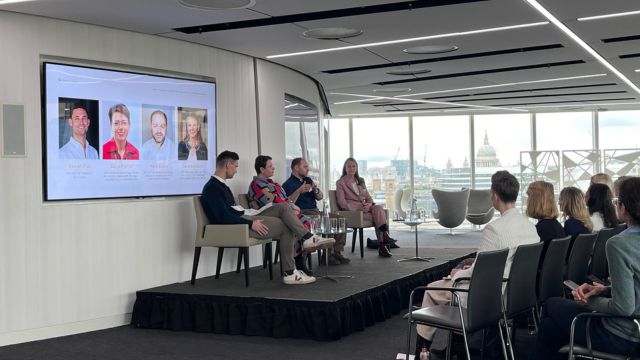Upload Your CV
Send us your CV and a member of the team will be in touch to discuss open opportunities with you.
This article recounts the key takeaways from our latest ‘How to transition from CMO to...

This article recounts the key takeaways from our latest ‘How to transition from CMO to NED’ event in partnership with EY. It is an excellent read for anyone looking for career growth options beyond the Chief Marketing Officer (CMO) role.
On Wednesday, October 9th, our Executive Search team co-hosted our latest CMO to NED event in partnership EY’s Centre for Board Matters.
EY Centre for Board Matters – supporting members in their oversight role by helping them address complex boardroom issues:
Attendees heard from Marketing Leaders turned Non-Executive Directors:
Together, they discussed their own career journeys and the learnings they’ve gained along the way. Continue reading for key takeaways from the morning.
As a Chief Marketing Officer, there are a variety of options to progress your career. From Operating Partner to Chief Executive Officer, there are a variety of senior leadership roles that would benefit from your marketing skills. So, how do you know the NED title is the right one?
Before pursuing this career path, you should assess whether it aligns with your strengths, interests and professional goals. There are a range of reasons why you would pursue the role. For Celia Pronto, she knew she was ready for the role when she was seeking more variety in her marketing career.
You should also be aware of the differences between the leadership roles. Unlike an Executive role, where you drive the daily operations of a business, a NED provides oversight, governance, and strategic guidance.
As one panellist put it, “Your job is not to tell the executive team what to do; you’re there to ensure the business is well-run, appoint the right CEO, and help shape the company’s strategy from a high-level perspective.”
Once you know the role is right for you, it’s time to prepare. The process to securing your first Non-Executive assignment is unique to every other recruitment process you would have been involved with.
It's important to be aware that the process is usually lengthy. The journey often involves networking, upskilling and demonstrating your value in areas beyond your functional expertise.
Each of our panellists began preparing for the shift early in their careers. The skills required in the boardroom differ from those of an executive role. As a result, even your CV should look different than what you’ve used for all other marketing roles.
One key piece of advice from Sara Bennison was to write your NED resume early on. This way you can identify your skill gaps and take steps to fill them. By taking deliberate steps to expand your skill set, you strongly position yourself for future opportunities.
Finding your first assignment is often the hardest. “Boards are risk averse”, so they will tend to lean towards someone with established experience. As a result, your network is often the key to your first assignment.
Having people who can vouch for you and speak on your behalf is incredibly important. Executive Search firms are becoming increasingly important in searches as they’re uniquely connected with Private Equity firms.
Mark Evans shared that once you’ve secured that first role, you’ll often find the “snowball effect” happening. More doors will open that you didn’t know existed.
In recent years, we’ve seen increasingly more Non-Executive opportunities for senior marketers. Normally the board is dominated by finance, legal, and operational expertise.
Now, however, more brands are placing more focus on the customer. As a result, the board of directors need senior leaders with that in-depth understanding of customer behaviour. This is where marketers come in.
Each board requires different skills. Marketing professionals are uniquely positioned to offer insights into a variety of areas, such as consumer behaviour, brand strategy, and digital transformation. These are increasingly important for businesses navigating disruption and growth.
It’s important to understand which skills a particular board is looking for, so you know which one you’ll need to use most in your role.
Another core reason for marketing leadership to be a part of the board is the rapid developments we’re seeing in areas, such as GenAI. These developments, conversations and trends need to be at the forefront of brand’s minds and often marketers at the right person to lead them.
We want to extend a big thank you to our hosts at EY – Rebecca Hirst, Chief Marketing & Communications Officer UK, and Lise Evans, Associate Director, Brand, Marketing & Communications. As well as our excellent panellists, Celia Pronto, Mark Evans and Sara Bennison.
It was a truly informative and inspiring event, and we look forward to hosting more conversations for our CMO Community in the future.